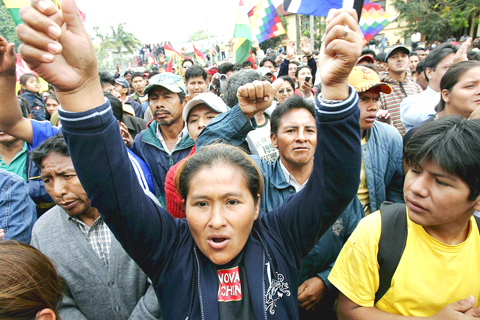Autonomy referendums in two Bolivian states yesterday could boost a movement to decentralize authority and block Bolivian President Evo Morales' populist reforms.
Morales’ quest to empower Bolivia’s long-oppressed Indian majority has alienated mixed-race residents in the nation’s eastern lowlands, fueling old regional grudges against a government centered in the western capital of La Paz.
The eastern states of Beni and Pando were likely vote yesterday to declare autonomy from the national government, following the lead of neighboring Santa Cruz, a hotbed of anti-Morales sentiment where 86 percent of voters opted for autonomy earlier this month.

PHOTO: EPA
Morales has dismissed all three referendums as illegal “surveys.” Organized by the pro-autonomy state governments, yesterday’s referendums were to be monitored by few observers and likely boycotted by the president’s supporters.
Still, the Bolivian tried to stave off the symbolic rejection of his government, making a rare trip on Friday to Pando’s remote capital of Cobija to deliver a new fleet of ambulances and announce a hastily assembled US$6 million infrastructure project.
In a country bitterly divided over Morales’ leftist policies, the eastern autonomy movement has replaced traditional political parties as his chief opposition. Deep regional ties have allied poor and sparsely populated Beni and Pando with wealthy Santa Cruz, and a fourth state, Tarija, holds an autonomy vote on June 22.
While the autonomy declarations call for steps toward a federalist model similar to the US, including the creation of locally elected state assemblies, they also seek more politically charged goals.
Statutes passed in Santa Cruz and on the ballot in Beni and Pando would protect huge cattle ranches and soy plantations from expropriation under Morales’ ambitious land reform. Santa Cruz also voted to withhold a bigger share of its natural gas reserves, which Morales needs to finance his reforms, although the state has yet to enforce the rule.
The autonomy movement has also stolen momentum from Morales’ central project, a draft constitution that would grant indigenous groups greater power.
While that document languishes on the shelf — it cannot become law until approved in a still unscheduled national referendum — the eastern lowland states are racing to sell Bolivians on their rival vision of a decentralized country.
“The constitution has not been put before the people,” while autonomy statutes are already up for vote, Beni governor Ernesto Suarez told La Razon newspaper. “They will be approved, and they will have an enormous legitimacy.”

In the sweltering streets of Jakarta, buskers carry towering, hollow puppets and pass around a bucket for donations. Now, they fear becoming outlaws. City authorities said they would crack down on use of the sacred ondel-ondel puppets, which can stand as tall as a truck, and they are drafting legislation to remove what they view as a street nuisance. Performances featuring the puppets — originally used by Jakarta’s Betawi people to ward off evil spirits — would be allowed only at set events. The ban could leave many ondel-ondel buskers in Jakarta jobless. “I am confused and anxious. I fear getting raided or even

Kemal Ozdemir looked up at the bare peaks of Mount Cilo in Turkey’s Kurdish majority southeast. “There were glaciers 10 years ago,” he recalled under a cloudless sky. A mountain guide for 15 years, Ozdemir then turned toward the torrent carrying dozens of blocks of ice below a slope covered with grass and rocks — a sign of glacier loss being exacerbated by global warming. “You can see that there are quite a few pieces of glacier in the water right now ... the reason why the waterfalls flow lushly actually shows us how fast the ice is melting,” he said.

RISING RACISM: A Japanese group called on China to assure safety in the country, while the Chinese embassy in Tokyo urged action against a ‘surge in xenophobia’ A Japanese woman living in China was attacked and injured by a man in a subway station in Suzhou, China, Japanese media said, hours after two Chinese men were seriously injured in violence in Tokyo. The attacks on Thursday raised concern about xenophobic sentiment in China and Japan that have been blamed for assaults in both countries. It was the third attack involving Japanese living in China since last year. In the two previous cases in China, Chinese authorities have insisted they were isolated incidents. Japanese broadcaster NHK did not identify the woman injured in Suzhou by name, but, citing the Japanese

RESTRUCTURE: Myanmar’s military has ended emergency rule and announced plans for elections in December, but critics said the move aims to entrench junta control Myanmar’s military government announced on Thursday that it was ending the state of emergency declared after it seized power in 2021 and would restructure administrative bodies to prepare for the new election at the end of the year. However, the polls planned for an unspecified date in December face serious obstacles, including a civil war raging over most of the country and pledges by opponents of the military rule to derail the election because they believe it can be neither free nor fair. Under the restructuring, Myanmar’s junta chief Min Aung Hlaing is giving up two posts, but would stay at the